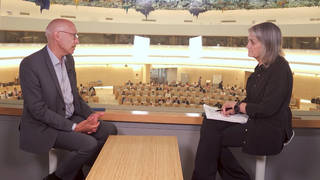A split appears to be growing between the White House and the Pentagon over the future of U.S. troops in Iraq after the Dec. 31 withdrawal deadline. On Saturday, a senior Obama administration official and a senior U.S. military official said that the United States is abandoning plans to keep any troops in Iraq past the year-end withdrawal deadline — other than about 160 troops who would be attached to the U.S. embassy. The Obama administration says a full withdrawal is needed because Iraq has voted against a U.S. request to grant full immunity to U.S. soldiers after this year. But on Monday, Defense Secretary Leon Panetta expressed hope Monday that a deal would be reached to allow U.S. troops to stay in Iraq.
Leon Panetta, U.S. Defense Secretary: “At the present time, you know, I’m not discouraged, because we’re still in negotiations with the Iraqis. General Austin [General Lloyd Austin], the ambassador continue discussions with the Iraqi leaders, and we’re hoping, ultimately, that they’ll be able to find an agreement here. So, at this stage of the game, you know, I think our hope is that the negotiators can ultimately find a way to resolve this issue in terms of what are the Iraqi needs and how can we best meet them once we’ve concluded our combat operations.”
The United States is now exploring the possibility of keeping troops after the end of the year, but placing them under the NATO umbrella to protect them legally. Raed Jarrar is an Iraqi-American blogger and political advocate based in Washington, D.C.
Raed Jarrar, blogger: “There are two tracks that the Pentagon is trying to keep troops in Iraq: either by keeping them under an agreement with the Iraqi government, which seems very unlikely by now, or by keeping them under an agreement between the NATO and Iraq, an agreement that was signed in 2009. And this agreement was just sent to the Iraqi parliament for ratification. If the parliament approves that agreement, maybe we will have a few hundred or thousand U.S. troops staying in Iraq as NATO forces.”










